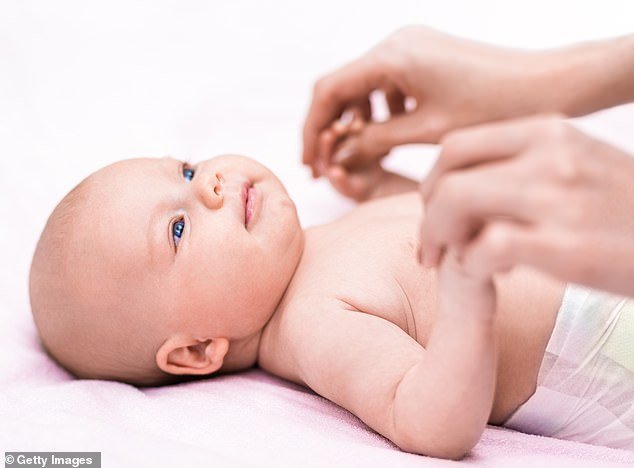For those who walk the path of parenthood, there are few joys to equal that of delivering a new life into the world.
Those first moments are filled with the love a new baby brings the second it lands in your arms. The feel and the smell of newborn skin on skin.
The meeting and greeting of the face you had only before glimpsed in a blur of black and white on a scan image. The papery fingernails, the wide-open eyes and the pride — you made this. It’s like magic, and tears of happiness flow.
For those who walk the path of parenthood, there are few joys to equal that of delivering a new life into the world [File photo]
For the majority of parents, this is the beginning of the next chapter of their life story, and we are blessed because the UK is one of the safest countries in which to give birth.
However, for some, this is the point at which it can all go horribly wrong, as group B streptococcus (GBS) — a bacterium that can be carried by the mother and passed on to the baby during childbirth — begins its deadly work.
Around 800 babies a year develop a GBS infection in the UK and, of those who do, 50 will die — the majority within the first 24 hours of life.
Seventy more are left with life-changing disabilities including brain damage, and require a lifetime of personal care.

I have recently discovered that out of the estimated 80 hospitals we require for the trial to screen 320,000 women, so far only 15 have been able to commit to doing so, writes Nadine Dorries
GBS is harmless to the estimated one in four women who carry it during labour, but it can cause meningitis and sepsis in vulnerable newborns who don’t yet have the immune strength to fight it off if it is passed on. This can prove fatal.
It is a silent killer, because we can’t see it, and we often don’t know it’s there until it’s too late. It is the single major cause of death by infection in newborns. However, in 90 per cent of cases, it is entirely avoidable.
GBS is a bacterium that can live in the lower birth canal and around the anus, and as a baby makes its journey into the world, it can become smeared with it and ingest it.
As a result, some babies will develop deadly conditions and, in a worst-case scenario, their immune system will be overwhelmed within hours.
This can have tragic and devastating consequences.
So, how is this avoidable? In 2019, as a health minister, I was proud to announce that the large-scale National Institute for Health Research-funded clinical trial on testing for GBS had received ethical approval in England. This trial has been established to compare the current risk-based approach with routine testing.
This involves either an antenatal ECM test [enriched culture medium test, carried out via swab] or a new rapid test carried out during labour.
(The trial will also examine the case for screening all pregnant women for GBS — as is already undertaken in many other developed countries, such as the U.S., France, Spain, Canada and Australia.)
Those women testing positive for GBS could then be managed by a clinician, and may have intravenous penicillin administered during labour.
Studies show that as long as the mother receives her antibiotics a clear two hours before the baby is delivered, the treatment is more than 90 per cent effective. GBS has remained responsive to penicillin since the 1950s.
Sadly, the start of the trial was halted due to the pandemic and the unavoidable pressure on hospital laboratories.
However, it will hopefully recommence in April.
I have recently discovered that out of the estimated 80 hospitals we require for the trial to screen 320,000 women, so far only 15 have been able to commit to doing so.
The sad fact is that not one single woman has been swabbed as a part of the screening trial, which is due to report findings in 2022.
At present, on arrival at the hospital, women are risk-assessed based on their maternal his-tory: did the woman have GBS last time she gave birth? Has she had a urine infection during pregnancy which demonstrated the presence of GBS in her urine? Has the mother presented with a fever during labour?
She will only be swabbed and tested for GBS based on the outcome of that assessment.
Despite the Royal College of Obstetricians and Gynaecologists’ (RCOG) recommenda-tions stating that a gold- standard enriched culture medium swab test should be used, many hospitals are using an alternative test which is believed to give a higher number of false negatives.
Last week, I wrote to all hospital trust chief executives asking them to ensure that when a woman is swabbed for GBS in a risk assessment, the test recommended by the RCOG is used.
I would like to see every pregnant woman in the UK tested for GBS at a clinic check at 35 to 37 weeks.
To reach his point, we need to gather solid evidence that this would work and would dramatically reduce the number of GBS complications at birth.
To gather that evidence correctly, we need the gold-standard ECM test to be the default test.
Separately, we also need 80 trusts across the UK to participate in the trial.
This a challenge that this Government will not shy away from, because we don’t just want the UK to be one of the safest countries in the world to give birth, we want it to be the safest.
We cannot reach that point until we eliminate GBS in pregnant women and universal screening is introduced.
Under the microscope:
Former footballer and now TV pundit John Hartson, 45, takes our health quiz

Former footballer and now TV pundit John Hartson, 45, takes our health quiz
Can you run up the stairs?
Absolutely. My wife, Sarah, 47, and I take our labradoodle, Bella, for 15km walks two or three times a week. I’m having to tone it down a little, as I had a knee replacement in December.
How has the pandemic affected you?
I’ve had dozens of tests because of doing punditry in different stadiums. I’ve not had Covid, nor has Sarah or our daughters [Lena, 11; Stephanie, nine; and Paige, six].
Get your five a day?
Probably. My wife makes me soups packed with vegetables.
Any vices?
I love chocolate and crisps, and I like a couple of pints. I used to like gambling but stopped nine years ago: things hit rock bottom in 2011 when Sarah threatened to leave. I still attend Gamblers Anonymous meetings.
Worst illness?
In 2006, when I was playing for West Brom, I found a small lump in one of my testicles but it took me four years to get it checked. It was a tumour and the cancer had spread to my lungs and brain. I had chemo, radiotherapy, an operation on each of my lungs and my brain and testicle. I went from 17st to 11st and very nearly died.
Had anything removed?
My testicle. They asked if I wanted a prosthetic one but I said I was happy to live with the one.
Cope well with pain?
I don’t care how tough you are, anyone who tells you they like pain is lying. My worst was after one of my lung operations. I was on a morphine drip but the pain was still horrific.
Ever dieted?
Yes. My weight has yo-yoed all my life. I am 6ft 2in and during my playing career it veered between 14st 5lb and 15st 5lb. I’m now about 16st 5lb. Having come through a cancer battle, I don’t feel I need to lose weight.
Ever have plastic surgery?
Probably not. I had an accident two years ago when the golf buggy I was in crashed into a tree and I had 48 stitches across my head. I already had a massive scar across the back of my head, from having my brain tumour removed, but I’m not bothered about plastic surgery. I’m not that vain.
Ever been depressed?
I’ve never had professional help but, yes, I’ve been depressed. I’ve been through a divorce [his first marriage ended in 2006] and I gambled a lot.
Hangover cure?
Water, a bacon sandwich, relax on the settee and put on Loose Women.
What keeps you awake?
Nothing. As soon as my head hits the pillow, I’m out.
Any phobias?
Sleeping in the pitch black. To this day, I have to have the landing light on.
John works with KP Nuts to help raise awareness of testicular cancer. Interview by Nick McGrath
